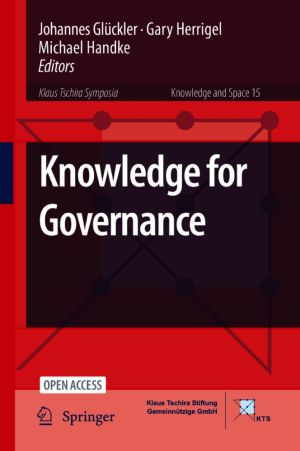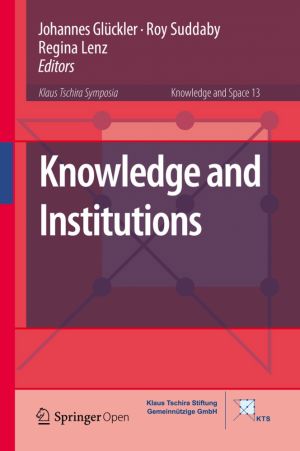Knowledge and Institutions
by Johannes Glückler, Roy Suddaby, Regina Lenz
DescriptionDetailsHashtagsReport an issue 






Book Description
This book bridges the disciplinary boundaries within the social sciences to explore the role of social institutions in shaping geographical contexts, and in creating new knowledge. It includes theorizations as well as original empirical case studies on the emergence, maintenance and change of institutions as well as on their constraining and enabling effects on innovation, entrepreneurship, art and cultural heritage, often at regional scales across Europe and North America. Rooted in the disciplines of management and organization studies, sociology, geography, political science, and economics the contributors all take comprehensive approaches to carve out the specific contextuality of institutions as well as their impact on societal outcomes. Not only does this book offer detailed insights into current debates in institutional theory, it also provides background for scholars, students, and professionals at the intersection between regional development, policy-making, and regulation.This open book is licensed under a Creative Commons License (CC BY). You can download Knowledge and Institutions ebook for free in PDF format (6.1 MB).
Book Details
Title
Knowledge and Institutions
Subject
Sociology and Social Sciences
Publisher
Springer
Published
2018
Pages
309
Edition
1
Language
English
ISBN13
9783319753270
ISBN10
3319753274
ISBN13 Digital
9783319753287
ISBN10 Digital
3319753282
PDF Size
6.1 MB
License

Related Books

This volume explores interdependencies between knowledge, action, and space from different interdisciplinary perspectives. Some of the contributors discuss knowledge as a social construct based on collective action, while others look at knowledge as an individual capacity for action. The chapters contain theoretical frameworks as well as experiment...

This book discusses a core question in many fields of the social sciences, namely how to create, share and adopt new knowledge. It creates an original space for conversation between two lines of research that have developed largely in parallel for a long time: social network theory and the geography of knowledge. This book considers that relational...

This book presents a strong philosophical, theoretical and practical argument for the mainstreaming of indigenous knowledge in curricula development, and in teaching and learning across the African continent. Since the dawn of political independence in Africa, there has been an ongoing search for the kind of education that will create a class of pr...

This open book focuses on theoretical and empirical intersections between governance, knowledge and space from an interdisciplinary perspective. The contributions elucidate how knowledge is a prerequisite as well as a driver of governance efficacy, and conversely, how governance affects the creation and use of knowledge and innovation in geographic...

This open book provides a concise introduction to economic approaches and mathematical methods for the study of water allocation and distribution problems. Written in an accessible and straightforward style, it discusses and analyzes central issues in integrated water resource management, water tariffs, water markets, and transboundary water manage...

This open access report presents findings from the five Latin American countries that participated in the second cycle of the IEA International Civic and Citizenship Education Study (ICCS 2016). ICCS 2016 investigated the ways in which a range of countries are preparing their young people to undertake their roles as citizens during the second decad...

